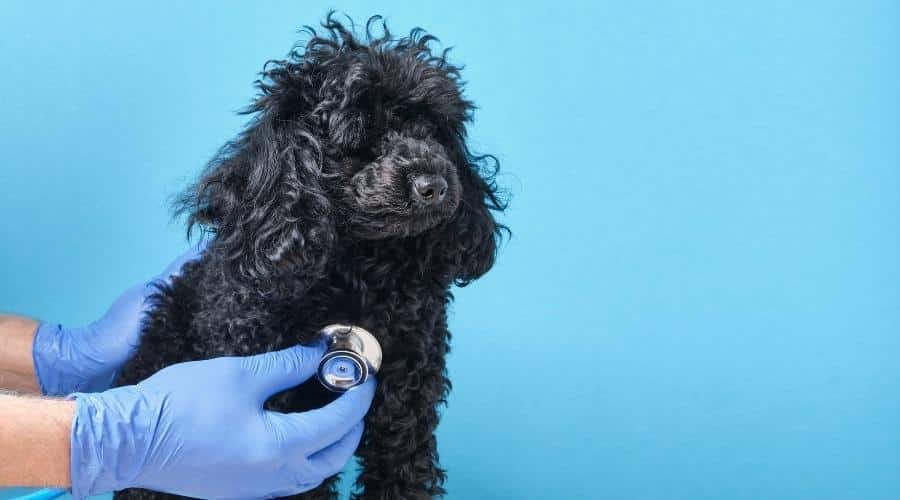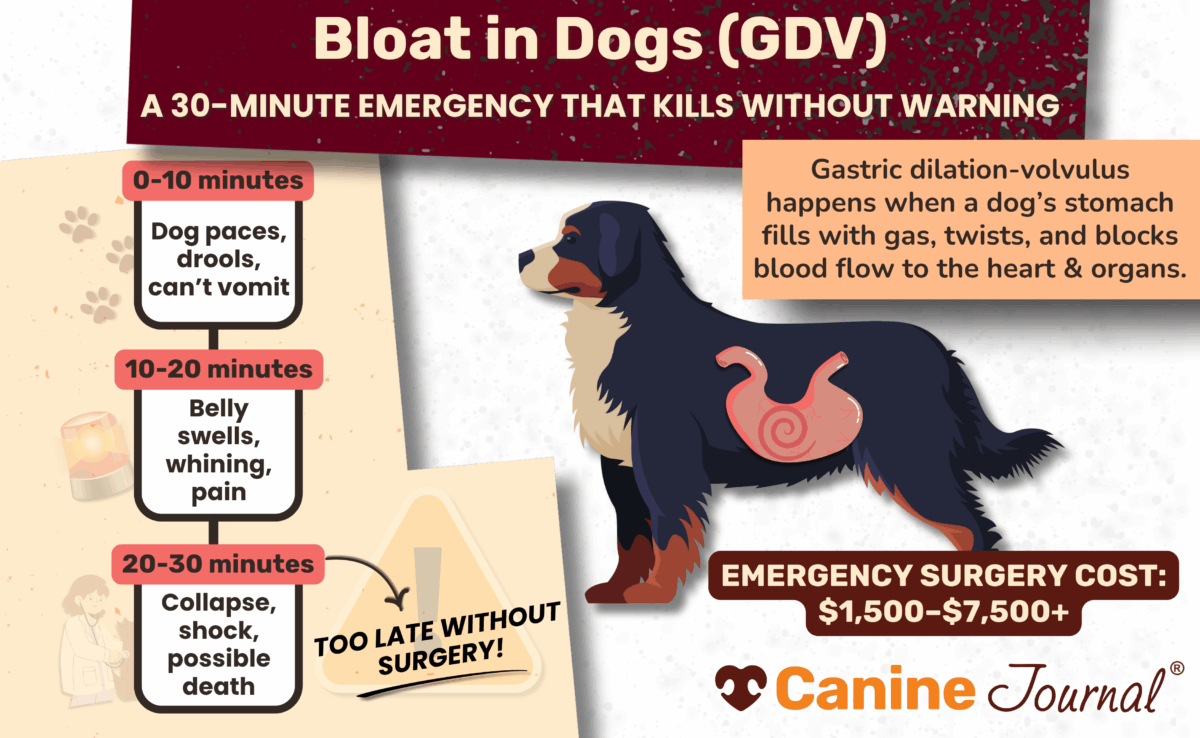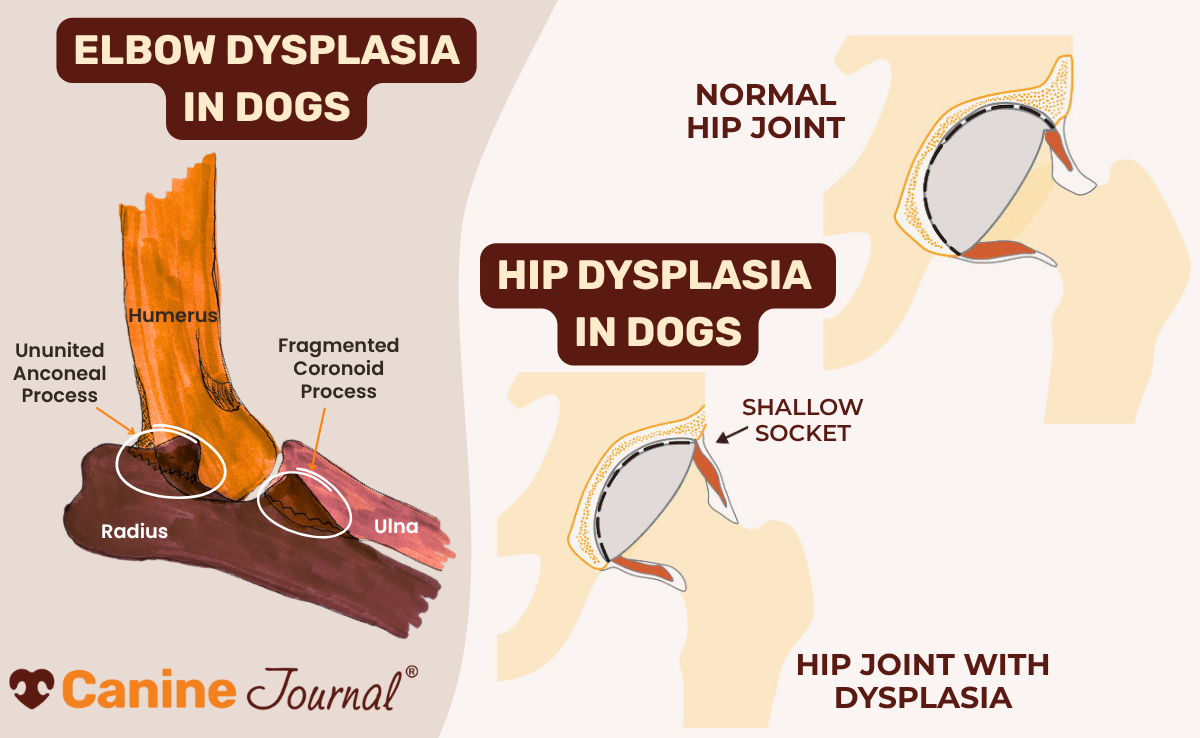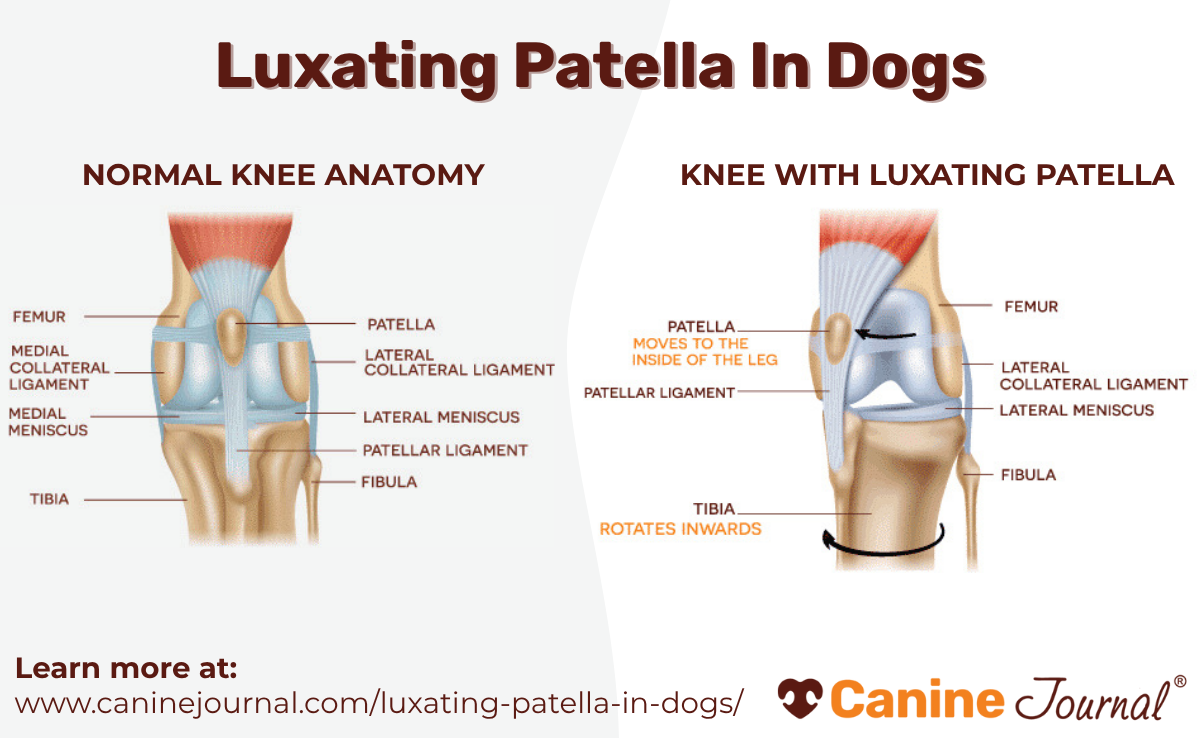Is Your Poodle At Risk? 12 Poodle Health Issues Every Owner Should Watch For
When you purchase through links on our site, we may earn a commission. Here’s how it works.
Poodle health issues can catch even the most attentive pet parents off guard, especially because some conditions show little to no warning signs at first. Whether you have a Standard, Miniature, or Toy Poodle, understanding the most common health risks is essential to giving your pup a long, happy life.
Table of Contents
Beloved for their intelligence, energy, and iconic curly coats, Poodles are incredibly adaptable and make fantastic companions. But like all purebred dogs, they are prone to certain genetic and breed-specific health concerns.
No one wants to think about their dog getting sick, but being informed is the best way to protect your pup. We’ll walk through the health issues most likely to affect Poodles, what warning signs to look for, and how to stay ahead of serious problems.

From The Veterinarian
To get some insight from the medical perspective, I spoke with Dr. Rebecca MacMillan, BVetMed BSAVA PGCertSAM MRCVS. Dr. MacMillan is a veterinarian and surgeon specializing in small animal practice. Here’s what she had to say:
All three varieties of Poodle, standard, miniature, and toy, are at risk from progressive retinal atrophy (PRA), which is an eye disorder leading to gradual loss of retinal function. This can lead to blindness and cannot be reversed. The condition is hereditary, so animals affected by the condition should not be bred. Genetic testing and regular eye exams can help to make sure that only healthy dogs are mated.
Von Willebrand’s disease (VWD) is a bleeding disorder caused by a lack of the clotting agent known as Von Willebrand factor. This condition is also hereditary, like PRA, and can affect all Poodles, so pre-mating testing is advisable.
Epilepsy is another problem that all Poodles can be affected by. It causes seizure episodes and requires long-term medication to keep under control.
– Dr. Rebecca MacMillan, BVetMed BSAVA PGCertSAM MRCVS
What Every Poodle Owner Should Know
Poodle health issues aren’t just a concern for aging dogs; many conditions can begin silently and impact your pup’s quality of life long before symptoms show. From Addison’s disease to hip dysplasia and inherited eye disorders, staying ahead of these risks is one of the best ways to protect your dog’s long-term health and happiness.
While Poodles are generally a healthy breed, their average lifespan of 12 to 15 years depends heavily on early detection, preventative care, and proper treatment.

Planning Ahead for Vet Bills
Poodles, whether Standard, Miniature, or Toy, are susceptible to several chronic and hereditary health conditions. From Addison’s disease to hip dysplasia and eye disorders like PRA, managing their care can become costly over time. Routine vet visits, diagnostics, and potential surgeries can quickly add up.
Pet insurance can help offset these expenses by covering breed-specific issues and unexpected emergencies, giving you peace of mind as your Poodle ages. Learn more about the best pet insurance options for Poodles in our in-depth guide.
Top 12 Most Common Poodle Health Issues
Some of these conditions can be life-threatening if left untreated. Here are the 12 most common Poodle health issues, and how to recognize them before it’s too late.

1. Progressive Retinal Atrophy (PRA)
PRA is a genetic eye disease that causes gradual vision loss, eventually leading to blindness. It typically starts with trouble seeing in low-light settings and worsens over time.
PRA Symptoms:
- Night blindness or trouble seeing in low light
- Bumping into walls or furniture
- Dilated pupils
- Eyes appear reflective under light
Diagnosis & Treatment
To diagnose PRA, your vet will examine your dog’s eyes using a fundoscopic exam and may refer you to a veterinary ophthalmologist. An electroretinogram (ERG) can confirm retinal function, and genetic testing is available for early screening.
Treatment options:
- No cure: PRA is irreversible and progressive.
- Management: Dogs adapt well to routine and safety measures like gating stairs and using nightlights.
- Supplements: Some owners try antioxidant supplements to support eye health, though results vary.
Early diagnosis helps you create a safer environment and avoid injuries as vision declines.
Prevention Tip:
If you’re buying from a breeder, ask for PRA-clear certification through genetic testing. Avoid breeding affected dogs.
2. Addison’s Disease
Addison’s disease is a hormonal disorder in which the adrenal glands produce insufficient cortisol and aldosterone. It’s most common in Standard Poodles and can become life-threatening if untreated. In some cases, it can be a side effect of treatment for Cushing’s disease.

In dogs, Addison’s disease is often the result of immune-mediated destruction of adrenal tissue. It can also be caused by damage to the glands from infection, trauma, or disease like cancer.
Addison’s Disease Symptoms:
- Fatigue and muscle weakness
- Vomiting or diarrhea
- Increased thirst and urination
- Loss of appetite and weight
- Shaking or trembling
- Dehydration or collapse (in severe cases)
Diagnosis & Treatment
Your veterinarian will run blood tests to check for electrolyte imbalances (such as low sodium and high potassium), followed by an ACTH stimulation test to confirm the hormone response. Imaging techniques, such as X-rays or ultrasound, may help rule out other potential issues.
Treatment depends on severity:
- Mild cases: Oral steroids and monthly hormone injections (like DOCP) to replace adrenal function.
- Severe cases: Emergency care with IV fluids, corticosteroids, and hospitalization if your dog is in Addisonian crisis.
Lifelong hormone therapy and regular vet checkups help keep Addison’s manageable.
Prevention Tip:
While Addison’s disease cannot be prevented entirely, early detection and consistent treatment can help keep it manageable. Regular checkups and stress avoidance help reduce flare-ups.
3. Gastric Dilatation Volvulus (Bloat)
Canine bloat is a life-threatening condition where the stomach fills with gas and twists on itself, cutting off blood flow. This is most common in large, deep-chested breeds, such as Standard Poodles, and can escalate rapidly.

It is often triggered by dogs eating or drinking too fast. Anywhere from 15 to 30% of dogs do not survive canine bloat.
Bloat Symptoms:
- Distended, hard abdomen
- Unproductive retching or dry heaving
- Restlessness or pacing
- Pale gums
- Excessive drooling
- Collapse or signs of shock
Diagnosis & Treatment
Your vet will perform a physical exam and take abdominal X-rays to confirm gas buildup and stomach torsion. Blood tests may help assess shock and organ damage.
Treatment depends on timing:
- Early stages: IV fluids, gastric decompression, and medications to stabilize your dog.
- Severe or twisted cases: Emergency surgery to untwist and secure the stomach (gastropexy). Prognosis improves with rapid care.
Gastric torsion can be fatal without fast veterinary intervention; don’t wait if you see the warning signs.
Prevention Tip:
Provide your dog with a raised food and water bowl. Feed your Poodle multiple small meals throughout the day and avoid vigorous activity for at least 30 minutes after eating. Ask your vet about preventative gastropexy during spay/neuter surgery.
Bloat Is An Emergency
You cannot treat canine bloat at home. It requires veterinary treatment as soon as possible. It’s essential to note that canine bloat can develop rapidly and, in some cases, be fatal. Immediate emergency treatment is your best bet.
4. Thyroid Issues
Poodles, especially middle-aged to older ones, are prone to hypothyroidism, a condition where the thyroid gland doesn’t produce enough hormones. This slows metabolism and affects everything from energy to coat quality. Hyperthyroidism is rare but can occur due to thyroid tumors.
Thyroid Malfunction Symptoms:
- Weight gain without increased appetite
- Lethargy or low energy
- Dry, thinning coat or hair loss
- Cold intolerance
- Skin darkening or thickening
- Recurrent skin or ear infections
- Constipation or diarrhea
Diagnosis & Treatment
Your vet will conduct blood work to check thyroid hormone (T4) and TSH levels. Other lab tests may show related issues like high cholesterol or anemia. In rare cases, imaging may be used to check for thyroid tumors.
Treatment includes:
- Hypothyroidism: Daily oral thyroid hormone replacement (levothyroxine). Regular monitoring ensures correct dosage.
- Hyperthyroidism (rare): Usually due to a tumor, may require surgery or other interventions.
With proper treatment, dogs with thyroid issues typically live normal, healthy lives.
Prevention Tip:
Watch for early signs like changes in weight, coat, or energy. Annual blood panels can catch thyroid issues before symptoms become severe.
5. Hip Dysplasia
Hip dysplasia is a hereditary joint disorder where the ball and socket of the hip don’t fit properly, causing pain, inflammation, and progressive mobility issues, especially in Standard Poodles.

The malformation causes the joint to rub together rather than smoothly slide in. This malformation causes deterioration of the joint and impacts function.
Hip Dysplasia Symptoms:
- Stiffness or limping, especially after exercise
- Decreased range of motion
- Bunny hopping or abnormal gait
- Hind leg weakness or lameness
- Muscle loss in the rear legs
- Reluctance to jump or climb stairs
Diagnosis & Treatment
Diagnosis involves a physical exam with joint manipulation to assess movement and pain. X-rays confirm the severity of the malformation. Blood work may also be done to detect signs of inflammation or arthritis.
Treatment depends on severity:
- Mild cases: Weight control, physical therapy, anti-inflammatory medication, and joint supplements.
- Severe cases: Surgical options like femoral head ostectomy (FHO) or total hip replacement may be needed.
Early diagnosis and a personalized management plan can greatly improve your dog’s mobility and comfort.
Prevention Tip:
Choose a breeder who screens for hip dysplasia through OFA or PennHIP. Keep your dog at a healthy weight and provide low-impact exercise. Weight reduction, exercise restriction, physical therapy, anti-inflammatory medication, and joint supplements are all options your vet may recommend.
6. Epilepsy
Epilepsy is a neurological disorder that causes recurring, unprovoked seizures due to abnormal electrical activity in the brain. Standard Poodles are genetically predisposed to this condition, often developing it between the ages of 1 and 5 years.

Most cases are classified as idiopathic epilepsy, meaning there is no identifiable cause, though the condition is believed to be inherited.
Epilepsy Symptoms:
- Sudden, uncontrolled shaking or convulsions
- Stiffening of the limbs
- Collapse or falling over
- Loss of consciousness
- Drooling, urination, or defecation during a seizure
- Disorientation or pacing after an episode (post-ictal phase)
Diagnosis & Treatment
Diagnosis is made by ruling out other causes of seizures. Your vet will take a full history and perform a neurological exam, blood tests, and possibly advanced imaging like an MRI or spinal tap to rule out tumors or infections.
Treatment depends on frequency and severity:
- Mild cases: Monitoring without medication if seizures are rare and brief.
- Moderate to severe cases: Anti-seizure medications like phenobarbital, potassium bromide, or levetiracetam.
While epilepsy can’t be cured, most dogs live a full life with consistent treatment and monitoring.
Prevention Tip:
If your Poodle has epilepsy, avoid known seizure triggers such as stress, bright lights, or extreme excitement. Never breed affected dogs to prevent the condition from being passed on.
7. Hypoglycemia
Hypoglycemia, or low blood sugar, is especially common in Toy Poodle puppies due to their small size and fast metabolism, which can make it harder for them to maintain stable glucose levels.

It can also affect adult Poodles experiencing stress, poor nutrition, overexertion, or underlying conditions like liver disease, insulin-producing tumors, or Addison’s disease.
Hypoglycemia Symptoms:
- Disorientation or confusion
- Weakness or lethargy
- Shaking, tremors, or muscle twitching
- Lack of coordination or stumbling
- Loss of appetite
- Seizures or collapse (in severe cases)
- Pale or grayish gums
Diagnosis & Treatment
Vets will check your dog’s blood glucose levels and may perform additional tests (like insulin levels, liver panel, or ultrasound) to identify the root cause.
Treatment depends on severity:
- Mild cases: Immediate feeding or rubbing sugar water/corn syrup on the gums.
- Severe or chronic cases: IV glucose and hospitalization, followed by treatment of the underlying condition.
Prompt action during an episode is critical—delays can lead to seizures or coma.
Prevention Tip:
Feed young Toy Poodles small, frequent meals and avoid skipping feedings. Monitor energy levels closely and keep a glucose source on hand during puppyhood.
8. Collapsed Trachea
Collapsed trachea is a progressive condition in which the cartilage rings of the windpipe weaken and flatten, making it difficult for air to pass through, most commonly seen in Toy and Miniature Poodles. This makes it increasingly difficult for air to pass through, leading to chronic coughing and breathing difficulties.
The condition is most commonly seen in Toy and Miniature Poodles due to their smaller airway anatomy and genetic predisposition, and it often worsens with age or exposure to respiratory irritants like smoke, dust, or extreme temperatures.
Collapsed Trachea Symptoms:
- Honking, dry, or unproductive cough
- Worsening cough during excitement or pressure on the neck
- Difficulty breathing or panting
- Gagging or retching
- Exercise intolerance
- Blue-tinged gums or tongue (in severe cases)
Diagnosis & Treatment
Diagnosis typically includes a physical exam, chest X-rays, and fluoroscopy to observe the trachea during breathing. Your vet may also perform a bronchoscopy under anesthesia for a detailed view.
Treatment options vary by severity:
- Mild cases: Antibiotics, cough suppressants, bronchodilators, weight loss, and use of a harness instead of a collar.
- Severe cases: May require surgery to insert tracheal stents or prosthetics, though outcomes vary.
Keeping your dog calm, cool, and at a healthy weight can greatly reduce flare-ups.
Prevention Tip:
Always walk your Poodle using a chest harness to reduce neck pressure, and avoid smoke, dust, or excessive barking, which can irritate the airways.
9. Sebaceous Adenitis
Sebaceous adenitis is an inherited autoimmune skin disease that affects the sebaceous (oil) glands, resulting in dry, flaky skin, hair loss, and chronic infections, particularly in Standard Poodles.

As the glands are destroyed, the skin loses its natural lubrication, making the coat brittle and prone to matting. Over time, affected dogs may develop thickened, discolored skin and secondary bacterial infections that require long-term management.
Sebaceous Adenitis Symptoms:
- Dry, brittle, or matted coat
- Patchy hair loss
- Dandruff or scaly skin
- Musty or oily skin odor
- Recurring skin infections
- Thickened or darkened skin
Diagnosis & Treatment
Diagnosis typically includes skin scrapings, cultures, and a skin biopsy to confirm inflammation and gland loss. Your vet may rule out other skin disorders first.
Treatment includes:
- Medicated shampoos and topical treatments
- Oral antibiotics for secondary infections
- Omega-3/6 fatty acid supplements and retinoids
- Immunosuppressive medications in severe cases
While there’s no cure, consistent management can greatly improve skin and coat condition over time.
Prevention Tip:
Ask breeders for genetic screening. Bathe your Poodle regularly with hypoallergenic shampoos to help soothe skin and reduce buildup.
10. Legg Calvé Perthes
This degenerative hip condition is most common in Toy and Miniature Poodles. It results from reduced blood supply to the femoral head, causing bone death, joint collapse, and chronic pain.
Legg Calvé Perthes Symptoms:
- Intermittent or persistent limping
- Pain when moving or stretching the hind leg
- Muscle atrophy in one rear leg
- Licking or chewing at the hip
- Decreased activity or reluctance to play
Diagnosis & Treatment
Vets use X-rays and orthopedic exams to confirm the diagnosis and rule out other hip issues like dysplasia. A full medical history helps with early detection.
Treatment options:
- Mild cases: Rest, pain management, weight control, and physical therapy.
- Moderate to severe cases: Surgery (femoral head osteotomy or hip replacement) followed by rehab.
Early intervention can prevent long-term mobility problems and pain.
Prevention Tip:
Only buy from breeders who screen for orthopedic conditions. Maintain a healthy weight to reduce joint stress in growing puppies.
11. Von Willebrand’s Disease
A common inherited bleeding disorder in Poodles, von Willebrand’s disease, prevents normal blood clotting due to low levels of clotting factor. It can cause excessive bleeding during injuries or surgeries. Some dogs may show no outward signs until a medical procedure reveals the condition, while others may experience spontaneous nosebleeds, bruising, or prolonged bleeding from minor wounds.
Though not always life-threatening, it requires careful management, especially before any surgical interventions.
Von Willebrand’s Disease Symptoms:
- Frequent nosebleeds or bleeding gums
- Blood in urine or stool
- Excessive bleeding from minor cuts
- Bruising easily
- Prolonged bleeding after surgery or nail trims
Diagnosis & Treatment
Genetic testing and clotting factor assays can detect vWD. Diagnosis is often made pre-surgery or when abnormal bleeding is noticed.
Treatment options:
- Transfusions of plasma or whole blood for acute bleeding episodes
- Desmopressin (DDAVP) to boost clotting temporarily (only in some vWD types)
- Extra surgical precautions and pre-op testing
There’s no cure, but dogs can live normal lives with awareness and careful management.
Prevention Tip:
Screen breeding dogs for vWD. Let your vet know before surgeries or dental procedures if your dog has or may carry this condition.
12. Patellar Luxation
A luxating patella, or dislocated kneecap, is a common orthopedic condition among dogs. It can affect both the hind and front legs. Patellar luxation occurs when the kneecap slips out of its normal position, affecting Toy and Miniature Poodles most commonly. It can cause limping, skipping, and pain during activity.

Luxating Patella Symptoms:
- Intermittent limping or “bunny hopping”
- Skipping or holding up one hind leg while walking
- Knee joint popping or locking
- Decreased interest in exercise
- Signs of discomfort after activity
Diagnosis & Treatment
Vets use palpation during physical exams and confirm severity with X-rays. Patellar luxation is graded from 1 (mild) to 4 (severe).
Treatment depends on grade:
- Grade 1–2: Pain relief, joint supplements, weight management, and restricted activity.
- Grade 3–4: Surgery to realign the kneecap and stabilize the joint, followed by rehab.
Early treatment helps prevent arthritis and avoid permanent joint damage.
Prevention Tip:
Avoid excessive jumping or stair climbing in puppies. Keep your dog lean and active to reduce stress on joints.
Common Poodle Health Issues By Size
While all Poodles, Standard, Miniature, and Toy, can be affected by the health conditions described above, specific issues tend to appear more frequently based on the dog’s size and physical structure.

For example, larger breeds like Standard Poodles are more prone to orthopedic and gastrointestinal conditions, while smaller Poodles often face joint instability and blood sugar challenges.
Standard Poodle Health Issues
- Gastric dilatation-volvulus (Bloat)
- Sebaceous adenitis
- Addison’s disease
- Hip dysplasia
- Cushing’s Disease
- Cancer
- Kidney disease
- Ear infections
Toy Poodle Health Issues
- Luxating patella
- Legg Calvé Perthes disease
- Dental disease
- Cataracts
- Hypoglycemia
- Skin tumors
- Bladder stones
- Cushing’s disease
Miniature Poodle Health Issues
Along with those medical concerns addressed above, Mini Poodles can also be susceptible to the following:
- Dental disease
- Mitral valve disease
- Viral infections
Please keep in mind that this is not a complete list. You should speak with your vet about any health concerns you have. You can also ask for health screenings and do an at-home dog DNA test, which can shed some light on your puppy’s breed makeup, as well as the potential for some genetic health issues.
Early Detection & Health Screening for Poodles
“Purchasing your Poodle pup from a reputable breeder who has done all of the recommended pre-mating tests should increase your chances of having a healthy dog. Regular vet checks will also help spot any problems early on, allowing your pet to start treatment as soon as possible,” Dr. Rebecca MacMillan, BVetMed BSAVA PGCertSAM MRCVS.

The Poodle Club of America suggests some health testing for all three sizes of Poodle.
- Toy Poodles should have a progressive retinal atrophy DNA test, an eye examination by a boarded ACVO ophthalmologist, a DNA-based test, an exam for patellar luxation, and an OFA hip evaluation around the age of 1 year.
- Miniature Poodles should have a progressive retinal atrophy (PRA) DNA test, an eye examination by a board-certified ACVO ophthalmologist, an OFA evaluation for patellar luxation, and an evaluation for hip dysplasia.
- Standard Poodles are recommended for hip dysplasia testing and an eye examination by a board-certified ACVO ophthalmologist. Additionally, Standard Poodle owners may want to consider an OFA thyroid evaluation and cardiac exams.
Poodle Health Screening by Life Stage
| Life Stage | Key Screenings |
|---|---|
| Puppy (8 weeks – 12 months) | Vaccinations, deworming, basic blood work, hip and patella checks, monitor for hypoglycemia (Toy), genetic testing (PRA, vWD, LCPD). |
| Adult (1 – 6 years) | Annual exams, CBC and thyroid panel, dental cleanings, eye checks (PRA), Addison’s disease screening (Standard), orthopedic and skin evaluations. |
| Senior (7+ years) | Biannual exams, senior blood panel, ACTH test (if needed), urinalysis, X-rays, joint mobility check, cognitive and heart assessments, and full dental care. |
Average Costs For Poodle Health Issues
According to Fetch Pet Insurance, the most common conditions they cover for Poodles are oral inflammation, thyroid disorders, and epilepsy. The costs associated with treating these Poodle health conditions over a lifetime are:
- Oral inflammation: $1,209 to $2,072
- Thyroid disorders: $598 – $989
- Epilepsy: $3,045 – $4,758
Frequently Asked Questions
There are many questions about the wonderful Poodle breed and the various medical issues it faces. Below, I answer some of the most frequently asked questions about Poodle health issues. If I didn’t address yours, please let me know in the comments section. I’ll be happy to find the answer for you.
Do Poodles Have Lots Of Health Issues?
While Poodles are an incredibly cuddly and friendly breed, they do have the potential for several different health concerns. However, all dog breeds have a risk and predisposition for certain medical conditions. No breed is free from all medical concerns. Addressing your pet’s health needs as they age is part of caring for all dogs.
What’s The Leading Cause Of Death in Poodles?
Sadly, a good number of Poodles develop cancer in their senior years, which leads to their death.
What Is The Average Lifespan Of A Poodle?
Poodles are fairly long-lived, with an average lifespan between 12 and 15 years. Some have been known to live 18 years or longer. Of course, this depends on each dog’s individual health, genetics, and lifestyle. Learn more about the Poodle’s lifespan in our detailed guide.
Are Poodles Prone to Neurological Problems?
Poodles can develop a neurological disease called degenerative myelopathy. Some may also develop intervertebral disc disease, which can result in nerve damage, back pain, and coordination issues. Canine epilepsy is also a neurological condition that the breed is prone to.
Can a Healthy Diet Help Prevent Poodle Health Issues?
While diet can’t prevent genetic conditions, feeding your Poodle a high-quality, balanced diet helps support immune health, joint strength, and a healthy weight, reducing the risk of secondary complications.
Keeping Your Poodle Healthy
While you cannot control your Poodle’s genetics, you can significantly impact their overall health. A healthy, active lifestyle and balanced diet go a long way for both humans and dogs. Learn more about the best dog food for Poodles of all sizes, as well as how often you should walk your dog. We have also reviewed the best dog beds and toys for Poodles. And if you are wondering how much hair these curly-coated pups lose, we’ve covered Poodle shedding in detail.
Share Your Poodle’s Health Journey
Have you faced any of these health issues with your Poodle? Whether it’s managing Addison’s disease, navigating surgery, or spotting symptoms early, your story could help other owners make better decisions for their pets. We’d love to hear from you. Share your experience in the comments below.



